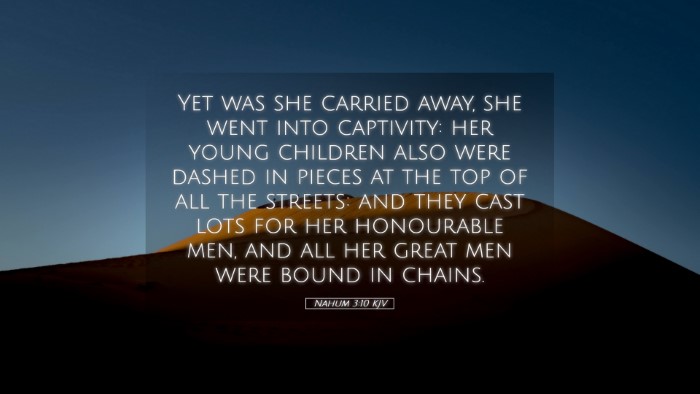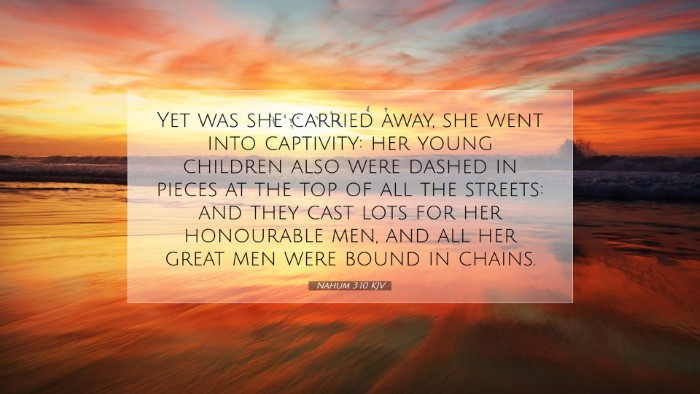Old Testament
Genesis Exodus Leviticus Numbers Deuteronomy Joshua Judges Ruth 1 Samuel 2 Samuel 1 Kings 2 Kings 1 Chronicles 2 Chronicles Ezra Nehemiah Esther Job Psalms Proverbs Ecclesiastes Song of Solomon Isaiah Jeremiah Lamentations Ezekiel Daniel Hosea Joel Amos Obadiah Jonah Micah Nahum Habakkuk Zephaniah Haggai Zechariah MalachiNahum 3:10
Nahum 3:10 KJV
Yet was she carried away, she went into captivity: her young children also were dashed in pieces at the top of all the streets: and they cast lots for her honourable men, and all her great men were bound in chains.
Nahum 3:10 Bible Commentary
Bible Commentary on Nahum 3:10
Nahum 3:10 - “Yet was she carried away, she went into captivity: her young children also were dashed in pieces at the top of all the streets: and they cast lots for her honourable men, and all her great men were bound in chains.”
Contextual Overview
The book of Nahum is a prophetic work that serves as a divine pronouncement against the city of Nineveh, the capital of the Assyrian Empire, known for its brutalities and enmity toward Israel.
Historical Background
Nahum prophesied during a time when Assyria was at the peak of its power, but also facing impending judgment from God due to its violent and oppressive actions. Nineveh's fall was seen as retribution for its sinfulness and cruelty, and Nahum's prophecies bring comfort to the Israelites, affirming that God is just and will not allow evil to go unpunished.
Analysis of Nahum 3:10
This verse reflects both the tragedy and the horror of captivity. Nahum vividly describes the consequences of Nineveh's rebellion against God. This prophecy serves both as a warning and a declaration of the inevitable judgment that falls on nations that defy divine statutes.
Commentary Insights
Matthew Henry's Commentary
Henry highlights the sorrow and devastation that follows Nineveh's downfall. He emphasizes the barbaric nature of Assyrian conquest, where children are not spared the brutality of war. His observations can be distilled into several poignant points:
- The Wrath of God: The consequences of Nineveh’s actions are seen as direct results of divine judgment.
- Compassion for the Innocent: The mention of young children being “dashed in pieces” calls attention to the innocent suffering amidst a nation's collective punishment.
- Public Humiliation: The casting of lots for her honorable men underscores the shame that befell the once mighty city, transforming great leaders into figures of mockery.
Albert Barnes' Notes
Barnes provides a more theological reflection on the text. He points out that Nahum’s imagery serves to strengthen the faith of the Israelites while warning the Assyrians:
- The Fate of Nations: Barnes suggests that Nahum elaborates on the idea that no nation can escape the just hand of God; national pride and strength can be obliterated in an instant.
- Children and Collateral Damage: The graphic image of children being killed raises questions about divine justice, but Barnes asserts that it reflects the seriousness with which God views sin.
- Loss of Identity: He interprets the casting of lots as a symbol of the loss of dignity for the once-great city; it illustrates how power dynamics shift dramatically in the face of divine decree.
Adam Clarke's Exposition
Clarke emphasizes the prophetic element of Nahum’s message. His interpretation orbits around the theme of divine sovereignty and the collapse of human power:
- Prophetic Certainty: Clarke highlights that Nahum’s utterances were not mere predictions but authoritative proclamations grounded in God’s will, which assures believers of God’s sovereignty over nations.
- Judgment and Redemption: He sees this contrast between Nineveh’s judgment and Israel's potential restoration, offering a glimpse into God’s overarching redemptive plan.
- Date of the Prophecy: Clarke notes that the destruction of Nineveh was both historical and prophetic, emphasizing that the prophecies of Nahum were fulfilled within a generation.
Theological Implications
The theological reflections derived from Nahum 3:10 are manifold. They speak to the character of God as just and sovereign, the reality of sin and its consequences, and the hope of deliverance for those who remain faithful.
Practical Applications
For pastors, students, and scholars, Nahum 3:10 serves as a sobering reminder of the weight of sin and the seriousness with which God regards injustice:
- Call to Righteousness: There is a call to pursue justice and righteousness both in personal and communal spheres, reflecting God’s character.
- A Reminder of Mercy: While the text is filled with judgment, it ultimately leads to a manifestation of mercy for those who repent.
- Sovereignty in Trials: In times of social or personal chaos, the affirmation of God’s sovereignty instills hope and trust in His plans.
Conclusion
In summary, Nahum 3:10 is a profound verse that encapsulates the themes of judgment, justice, and divine sovereignty. The insights from various commentaries illuminate the depth of the prophetic message Nahum delivered to the people of his time, and they continue to resonate today. The passage serves as a poignant reminder of God's unwavering stance against evil while holding out the hope of redemption for those who seek Him.


